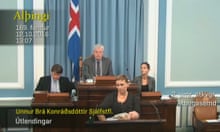Iceland’s crisis-hit coalition government has appointed a new prime minister and pledged to hold parliamentary elections before the end of this year.
A day after Sigmundur Davíð Gunnlaugsson – the first major casualty of the Panama Papers – stepped aside after popular outrage at revelations of his family’s offshore holdings, the ruling Progressive and Independence parties named the agriculture and fisheries minister, Sigurður Ingi Jóhannsson, as his successor.
Birgitta Jónsdóttir, leader of the opposition Pirate party whose support has soared in the crisis, said the centre-right government – having rejected demands to stand down immediately and call snap elections – had agreed to bring forward polls due in spring 2017 to this autumn.
It was unclear whether the move would satisfy angry Icelanders, who staged a mass demonstration outside parliament for a third consecutive day. “We want new elections,” said Atli Magnusson, a behavioural analyst, standing in a chilly drizzle with 3,000 other protesters. “They don’t have our trust any more.”
As protestors lobbed yoghurt, eggs and bananas at the walls and windows of the national assembly, Sigurborg Osk Haraldsdottir, a landscape architect, said: “We have to be able to have our say on what has happened. It has done great damage. We want these people to go – and go for good.”
Gunnlaugsson stepped aside as prime minister on Tuesday for “an unspecified amount of time” after leaked documents revealed his wife owned a British Virgin Islands-based company with multimillion-pound claims on Iceland’s failed banks, sparking popular outcry.
“We expect to have elections this autumn,” Johanssonn told reporters, insisting the coalition had the necessary support to keep running the country despite the protests. “We will continue our work together. We are of course hoping this will help bring stability in the political system.”
He said the government’s decision to hold elections in the autumn would give it time to complete one of the biggest economic policy changes in decades - the ending of capital controls introduced to rescue the economy from the 2008 financial crisis.
Jóhannsson is expected to meet Iceland’s president, Ólafur Ragnar Grímsson, on Thursday to seek his approval to become the country’s next prime minister. The Independence party leader and finance minister, Bjarni Benediktsson, said the government had “responded to the events of the past few days”.
He warned that a planned no-confidence motion tabled by opposition parties and likely to be voted on before the end of the week would be comfortably defeated by the coalition, which holds an absolute majority with 38 of parliament’s 63 seats.
Opposition leaders earlier accused the government of trying to dodge voters’ anger. Árni Páll Árnason of the Social Democratic Alliance said the coalition was “trying to cling on to power while making the absolute minimum of changes, in order to evade the public”.
Jónsdóttir said the only way to repair what she called a “complete breach of trust between the nation and this government” was for fresh elections to be held. “They cannot just put a sticking plaster over this,” she told the Guardian. “This is a broken bone.”
She said Gunnlaugsson was a prime minister “on leave”, adding that polls had given Jóhannsson, who is favourite to take over the position, an approval rating of only 3% as recently as last month.
Observers predicted the government would ride out the storm, at least in the short term. “Unless something very unexpected happens, it seems likely to me that this government has survived, and will continue and hope this dies down,” said Stefania Oskarsdottir, an associate political science professor at Iceland University.
But an election held now would be likely to hand victory to Jónsdóttir’s Pirate party. Campaigning for grassroots democracy, more political transparency and internet freedoms, it has the support of a record 43% of the electorate, a Gallup poll conducted on Monday and Tuesday showed – significantly more than the combined score of the governing Progressive and Independence parties, which stood at 11.2% and 21.6% respectively.
Revelations this week that Gunnlaugsson’s wife invested her share of the proceeds from the sale of her family’s business in an offshore company that held millions of pounds of bonds in the three major Icelandic banks that collapsed in the financial crisis of 2008 sparked public fury and mass protests.
Gunnlaugsson is also accused of a conflict of interest because his government has been involved in negotiating deals with the collapsed banks’ international creditors, of which his wife’s company is one.
He sold his 50% stake in the company to his wife for $1 at the end of 2009, but did not declare an interest in the company when he was elected an MP earlier that year nor when he became prime minister in 2013.
His office said the couple had answered all questions about the assets, which they had “never sought to hide”. All relevant taxes had been paid in Iceland since 2008, it said, and no parliamentary disclosure rules had been broken.
The Guardian has seen no evidence to suggest tax avoidance, evasion or any dishonest financial gain on the part of Gunnlaugsson and his wife








